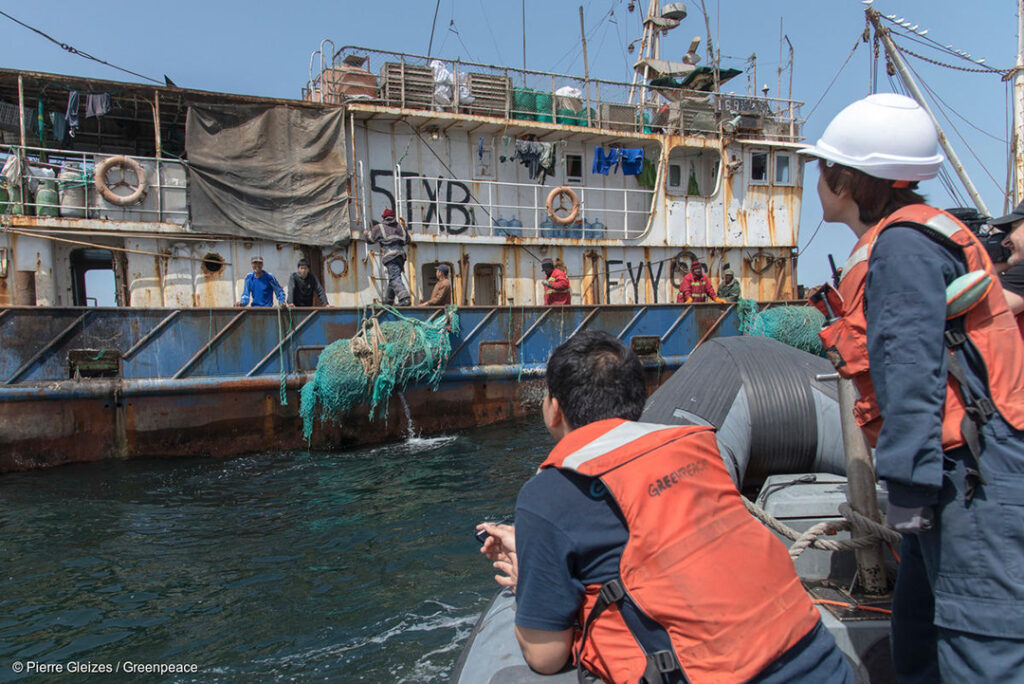ADF STAFF
China commands the world’s largest distant-water fishing fleet (DWF), has the world’s worst illegal, unreported and unregulated (IUU) fishing record, and its crews are known to abuse foreign workers, according to the Environmental Justice Foundation (EJF).
An EJF report released in March offers the first global analysis of China’s DWF. It was based on an analysis of China’s own limited fisheries data, which the nation made available in recent years. China’s fishing fleet has targeted African waters, especially the Gulf of Guinea, for decades.
“Chinese vessels have the highest rates (not just overall case numbers) of alleged IUU fishing and abuses,” Max Schmid, EJF’s chief operating officer, told news website Mongabay.com. Schmid added that it is “critical” that China embrace transparency and regulatory improvements to reform its fleet.
The report identified more than 300 confirmed and 240 suspected fisheries offenses between 2015 and 2019, and highlighted a range of human rights abuses and destructive fishing practices — such as bottom trawling — committed by Chinese vessels.
Around Africa, China’s bottom trawl fleet catches an estimated 2.35 million tons of fish a year worth more than $5 billion, according to the EJF. Besides robbing the continent of food and income, bottom trawling wrecks ecosystems that fish need to survive and indiscriminately catches all manner of marine life.
Chinese trawlers also often practice “saiko,” the illegal transshipment of fish at sea.
In 2017, saiko took 100,000 tons of fish from Ghanaian waters, costing the country millions of dollars in revenue and threatening food security and jobs, according to the EJF. The foundation also reported that 90% of trawlers engaged in saiko in Ghana are Chinese owned, usually through local front companies.
Ghanaian crew members aboard Chinese vessels went public this year with claims of abuse by Chinese captains and crew members. All 10 crew members interviewed by EJF had experienced or witnessed physical abuse by Chinese captains. Each member reported poor living conditions on the vessels and said they were forced to eat low-nutrition food and drink unclean water.
China’s intrusion into Ghanaian waters has had a catastrophic effect on more than 200 coastal villages that rely on fishing as their primary source of income. There was a drop in average annual income of up to 40% per artisanal canoe in the past 15 years or so, according to the EJF.
Due to illegal overfishing, Ghana’s fish stocks are in steep decline. Its small pelagic fish populations––those that live near the surface such as sardinella––have dropped 80% in the past two decades. One species, sardinella aurita, already is fully collapsed.
Artisanal fishermen in Sierra Leone blame foreign fleets for decimating the country’s fish stocks. As of July 2018, Chinese companies owned 66 vessels operating in Sierra Leone, according to a statement from the Chinese embassy.
The reduction of fish stocks forces local fishermen to go farther out to sea, spending valuable money on fuel but often returning with little or no catch. Sierra Leonean President Julius Maada Bio has said that illegal fishing costs the country about $50 million a year.
Saio Kamara, a youth association chairman in coastal Tamba Kula, said local fishermen are tired of the situation.
“When they come with their nets and catch all these fish, we can’t get our catch,” Kamara told Mongabay. “And that means we are spending all our money to go to sea for nothing.”
The EJF report called on China to ensure greater transparency regarding the true ownership of its vessels, file correct catch data, update information about sea crimes committed by its fleet, work to address labor abuses, and abolish government subsidies that fund the fleet by 2023, among other recommendations.
China is not likely to listen, Whitley Saumweber, a professor of marine affairs and senior associate of the Asia Maritime Transparency Initiative, told Mongabay.
“But if we can convince them that a commitment to transparency and global standards for sustainability are in their best interests, it would have a transformative effect on the global market and a cascading impact on the behavior of other fleets,” Saumweber said.

